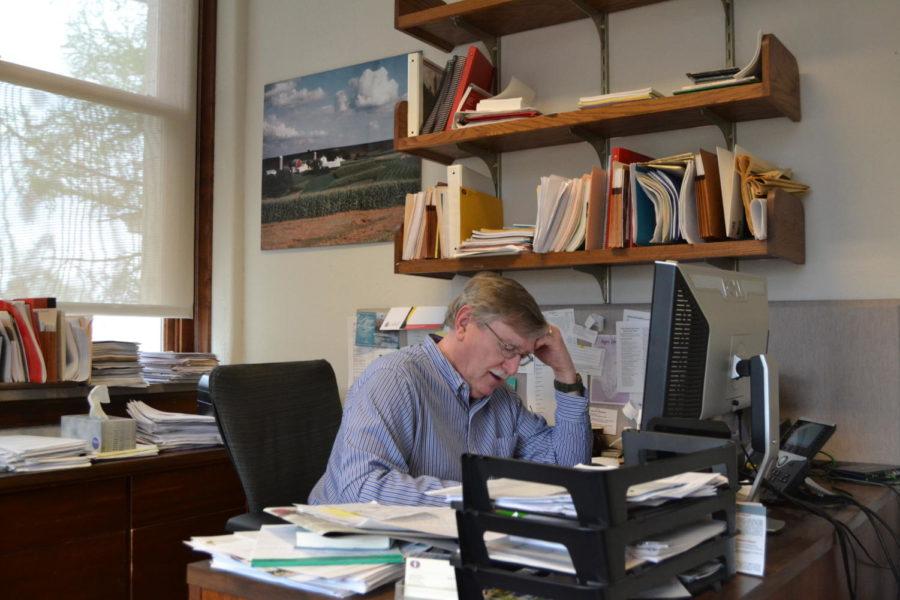Editorial: Leopold Center needs our support
Director of the Leopold Center, Mark Rasmussen, works in his office in 209 Curtiss April 18. The Leopold Center has been issuing grants for agricultural research purposes for thirty years.
August 24, 2017
Editor’s note: This editorial has been updated on Aug. 25 to correct the center’s operating budget to $200,000. The editorial originally stated the budget was $1.7 million, but this was the amount the state cut not the operating budget.
The Iowa Legislature shocked many in the state when they announced a plan to defund and close the Leopold Center for Sustainable Agriculture here at Iowa State.
The Leopold center, which was founded in 1987 to help protect Iowa’s natural and agricultural resources, was saved only by a line-item veto by then Governor Terry Branstad who let the funding cut of $1.7 million stand. Now, the Leopold Center has just $200,0000 to run the center and has formed a task force on how the center should move forward.
Last spring, the Editorial Board outlined the foolishness of the Legislature to defund the Leopold Center and instruct Iowa State to shut it down. We now want to redirect the focus to helping the center move forward in a positive and sustainable manner. We’ve highlighted a few suggestions that we feel could help the Leopold Center through this transition phase with the hope that the work around sustainable agriculture continues for the sake of our communities and state.
Future Funding
The possibility remains that the Leopold Center is allotted new state funding in future legislative sessions. Plans should then be made to seek private funding sources so that the research and educational aspects of the center continue.
Government funding for research is meant to help keep the integrity of the research and eliminate bias from special interest groups who may want a certain outcome. However, by eliminating public funding, the Leopold Center may have no other choice but to turn to private funding sources. Therefore, to help maintain the integrity of the work done by the Leopold Center, they should publish any future funding sources, public or private, and remain transparent on any potential conflicts of interest. Doing so can help keep the Leopold Center honest and true to its mission of serving the agriculture community and the general public.
Community Engagement
It was the work of dedicated students, staff and community members that helped convince Gov. Branstad to keep the Leopold Center open. That passion and engagement must continue. Currently, the task force charged with planning the future of the center is accepting comments from the public at listening sessions across the state. This is an excellent opportunity for members of the community to come forward and express what you want to see from the Leopold Center, or it can simply be a time to learn more about the center.
Keep in mind that the Leopold Center was a publicly funded institute that operated through a Land Grant University. Now it is devoid of public dollars and must turn to other income sources. The public has lost its investment, but doesn’t have to lose its influence. Engage in these discussions about the future of the Leopold Center and continue to fight for its research and outreach, as they are vitally important to the future health, both environmental and economic, of our state.
We can’t change what happened as the last legislative session ended. We must deal with our new reality. The fact is, this new reality requires more work from the public to support the institutions that we value.

















